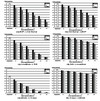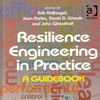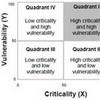 If you’re a regular reader of this blog, you will notice that many posts reviewing the literature now have a special icon. And that the journal reference in the post itself links back to the scientific journal website. That is because I have finally found the right outlet for disseminating my literature blogposts, or so I think, at least. As a blogger and emerging expert in my field, I often find exciting new peer-reviewed research I’d like to share, and researchblogging.org appears to be a good place to do just that.
If you’re a regular reader of this blog, you will notice that many posts reviewing the literature now have a special icon. And that the journal reference in the post itself links back to the scientific journal website. That is because I have finally found the right outlet for disseminating my literature blogposts, or so I think, at least. As a blogger and emerging expert in my field, I often find exciting new peer-reviewed research I’d like to share, and researchblogging.org appears to be a good place to do just that.
researchblogging.org
Research Blogging is a community-run non-profit organization. The organization was created by bloggers for bloggers, with the input of bloggers and blog readers who like to read about new developments in science and other fields. If you’re a blogger who writes about serious research, Research Blogging offers you a way to distinguish your serious posts from anything else, by directing your regular readers — and new readers — to the posts linking to published articles. You can read more on the idea behind researchblogging.org in this post on nextgenerationscience.com.
How to use Research Blogging?
![]() Research Blogging allows readers to easily find blog posts about serious peer-reviewed research. Firstly, blog posts will only appear on the Research Blogging web site if you have linked to the corresponding publication DOI in your post. See image left or my latest post for an example. Secondly, provided you use the icon above or categorize or tag your posts accordingly, your readers can easily spot and find your “serious” posts on the blog itself.
Research Blogging allows readers to easily find blog posts about serious peer-reviewed research. Firstly, blog posts will only appear on the Research Blogging web site if you have linked to the corresponding publication DOI in your post. See image left or my latest post for an example. Secondly, provided you use the icon above or categorize or tag your posts accordingly, your readers can easily spot and find your “serious” posts on the blog itself.
What does it mean to me?
A couple of things. One, writing the posts becomes slightly more complicated, since I have to search for the DOI, before I can make a post. That is a not so good thing. Two, reviewing the posts will really be a review and discussion, not simply a summary, since it now will be judged by a wider scientific community. That, however, is a good thing. Three, I will hopefully have a wider audience. That, too, is a good thing. Four, publicly disseminating my ideas and thoughts on the “established” literature so to speak, may lead to others picking up my ideas, and publishing them as their own. That is maybe a not so good thing, but I do not really fear that. Time will tell.
No supply chain bloggers?
What I found strange, though, is that there were no other supply chain bloggers on researchblogging.org. I am apparently the first one. Are supply chain researchers or academics not into blogging?
Links
- Research Blogging – researchblogging.org
- Research Blogging – my posts on researchblogging.org












